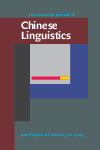
International Journal of Chinese Linguistics
Scope & Guideline
Innovating Research in Chinese Linguistic Theory
Introduction
Aims and Scopes
- Chinese Language Acquisition and Processing:
Research on how individuals, especially children, acquire and process the Chinese language, incorporating cognitive and linguistic theories to understand the mechanisms behind language learning. - Syntax and Sentence Structure:
Exploration of the syntactic structures and grammatical rules of Mandarin and other Chinese dialects, emphasizing the unique characteristics and complexities of Chinese sentence formation. - Phonetics and Phonology:
Studies examining the phonetic and phonological elements of Chinese, including tone specification and sound patterns, which are critical for understanding pronunciation and linguistic variation. - Cross-Linguistic Comparisons:
Comparative studies that analyze Chinese in relation to other languages, highlighting similarities and differences in linguistic features, which contribute to the understanding of language universals and typology. - Sociolinguistic Perspectives:
Investigations into the social aspects of language use in Chinese-speaking communities, including language contact, change, and the implications of language in cultural contexts. - Theoretical Linguistics:
Contributions that engage with theoretical frameworks in linguistics, such as cartography and generative grammar, to shed light on the structure and function of the Chinese language.
Trending and Emerging
- Multiword Sequence Processing:
An increasing focus on how multiword sequences are processed, particularly in early language acquisition, signifies a growing interest in cognitive linguistics and the interplay between language structure and processing. - Interventions for Language Disorders:
Research addressing language disorders in children is on the rise, indicating a trend towards applied linguistics and the importance of understanding language acquisition in therapeutic contexts. - The Role of Distributional Information:
Papers examining the role of distributional information in language processing reflect a trend towards data-driven approaches in understanding how linguistic elements function in context. - Cartographic Approaches to Syntax:
The application of cartographic frameworks to analyze Mandarin syntax is gaining traction, demonstrating a shift towards more nuanced syntactic analyses that account for the complexity of linguistic structures. - Language Contact and Change:
There is a notable increase in studies exploring language contact phenomena, suggesting a heightened interest in sociolinguistic dynamics and their implications for language evolution.
Declining or Waning
- Traditional Grammar and Prescriptive Studies:
There seems to be a decrease in papers focusing on traditional grammar rules and prescriptive approaches, as the field shifts towards more descriptive and empirical studies that reflect actual language use. - Historical Linguistics:
Research related to the historical development of Chinese language features is less frequently published, suggesting a waning interest in diachronic studies compared to contemporary linguistic analysis. - Pedagogical Approaches to Chinese Language Teaching:
While still present, there is a noticeable decline in papers solely focused on pedagogical methods for teaching Chinese as a second language, as the journal increasingly emphasizes theoretical and empirical research.
Similar Journals

RLA-Revista de Linguistica Teorica y Aplicada
Exploring the intersections of theory and application in linguistics.RLA-Revista de Linguística Teórica y Aplicada, published by Universidad de Concepción, Facultad de Humanidades y Arte, stands as a vital resource in the field of linguistics, delivering cutting-edge research and scholarly articles that contribute to both theoretical and applied linguistics. With its ISSN 0718-4883, this journal aims to foster robust discussions and innovations in linguistic theory, language acquisition, sociolinguistics, and applied linguistics methodologies. Although the journal currently does not provide open access options, it endeavors to reach a diverse audience, including researchers, professionals, and students, who are keen to explore the rich tapestry of language studies. By offering insights from both local and global perspectives, RLA does not only advance linguistic discourse but also encourages interdisciplinary collaboration, thereby solidifying its role as a pivotal publication in the linguistic academic community.

Yuyan Kexue-Linguistic Sciences
Pioneering Research in the Heart of Beijing's Linguistic LandscapeYuyan Kexue-Linguistic Sciences, published by SCIENCE PRESS, is a pivotal academic journal dedicated to the field of linguistics. With its ISSN of 1671-9484, this journal seeks to explore and illuminate various linguistic phenomena, contributing significantly to the understanding of language in both theoretical and applied contexts. Emphasizing interdisciplinary research, it welcomes contributions that bridge linguistics with areas such as cognitive science, sociology, and communication studies. Although it currently does not offer open access, Yuyan Kexue-Linguistic Sciences aims to provide a platform for researchers, professionals, and students alike to engage with cutting-edge studies and emerging trends in linguistics. Its publication location in Beijing positions it as a vital contributor to the global discourse in the linguistic sciences, catering to both a national and international audience. As the journal continues to grow, it aspires to maintain high academic standards and foster scholarly exchange for years to come.

Journal of Portuguese Linguistics
Unlocking the Richness of Portuguese Language StudiesThe Journal of Portuguese Linguistics is an esteemed peer-reviewed academic journal published by UBIQUITY PRESS LTD, dedicated to the exploration of the rich complexities of the Portuguese language and its various linguistic dimensions. With an ISSN of 1645-4537 and an E-ISSN of 2397-5563, this open-access journal has been disseminating valuable research since 2002, ensuring that knowledge is accessible to all scholars, professionals, and students interested in Linguistics. Based in Portugal, it features a distinct focus on the linguistics pertinent to the Portuguese language, facilitating discussions that span theoretical and applied interests. The journal holds a respectable Q3 quartile rank in the field of Linguistics and Language, reflecting its growing significance and contribution to academia, as evidenced by Scopus rankings that place it in the 71st and 68th percentiles in Arts and Humanities as well as Social Sciences. Researchers and practitioners alike will find Journal of Portuguese Linguistics to be an indispensable resource for fostering discourse and innovation in the study of language.
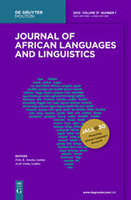
Journal of African Languages and Linguistics
Unveiling the Nuances of African Language StudiesThe Journal of African Languages and Linguistics, published by DE GRUYTER MOUTON, is a premier academic journal dedicated to the study and analysis of the diverse languages spoken across Africa. With an ISSN of 0167-6164 and an E-ISSN of 1613-3811, this journal has been pivotal since its inception in 1979, engaging readers with rigorous research and scholarly articles that span across critical themes in linguistics and language studies. Based in Germany, the journal holds a distinguished Q2 category ranking in the field of Linguistics and Language, according to the latest 2023 metrics, and features a commendable Scopus ranking, positioning it well within the 56th and 52nd percentiles in its respective categories. Although it currently does not provide open access, it is an essential resource for researchers, professionals, and students alike, striving to deepen their understanding of African languages, their structures, and their sociocultural contexts. With a continuously expanding scope and a commitment to advancing linguistic scholarship, the journal remains a significant platform for fostering academic dialogue and promoting innovative research in African linguistics.

Journal of Slavic Linguistics
Exploring the Depths of Slavic LinguisticsJournal of Slavic Linguistics, published by SLAVICA PUBLISHERS, is a key academic resource dedicated to the exploration of Slavic languages and linguistics. Established to provide a comprehensive platform for scholarly research, this journal addresses the intricate dynamics of Slavic phonetics, syntax, semantics, and discourse, making significant contributions to both theoretical and applied linguistics. The journal holds an impact factor that reflects its value in the linguistic community, particularly as it is ranked in the Q4 category in Linguistics and Language for 2023. With a focus on a wide range of topics within the field, the Journal of Slavic Linguistics serves as an essential reference for researchers, educators, and students alike, fostering an appreciation and deeper understanding of Slavic linguistic phenomena. Although currently not an Open Access journal, it remains accessible to a broad audience keen on engaging with contemporary linguistic scholarship.
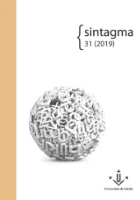
Sintagma
Fostering Academic Dialogue in Linguistics.Sintagma is a prominent academic journal dedicated to advancing the field of Linguistics and Language, published by the Universitat de Lleida in Spain. With an ISSN of 0214-9141 and an E-ISSN of 2013-6455, this journal has established itself as an open-access platform since 1989, thereby ensuring wide accessibility and dissemination of research. The journal's commitment to quality is reflected in its ranking within the Q4 quartile of Linguistics and Language in 2021 and a similar standing in Social Sciences and Arts and Humanities, which underscores its emerging importance in these fields despite recent challenges. Covering topics that span theoretical inquiries to applied linguistic studies, Sintagma invites researchers, professionals, and students to contribute to and engage with its evolving landscape from its unique academic perspective. With the convergence of research years from 2011 to 2018 and upcoming issues through 2024, the journal remains poised to provide insightful content that addresses the linguistic dimensions of contemporary society.

Catalan Journal of Linguistics
Fostering Innovation in Linguistic Research since 2002.Catalan Journal of Linguistics is a distinguished academic publication dedicated to the dynamic field of linguistics and language studies. Published by the Universitat Autònoma de Barcelona, this open-access journal has been disseminating impactful research since 2002, making significant contributions to the understanding of linguistic theory, language acquisition, and sociolinguistics, particularly within the Catalan language context. With a robust engagement in the scholarly community, it proudly holds a Q2 ranking in Linguistics and Language as of 2023, reflecting its commitment to high standards of research and innovation. The journal is accessible to a global audience, promoting the free exchange of knowledge beyond geographical boundaries, and serves as an essential platform for researchers, professionals, and students aiming to stay at the forefront of linguistic inquiry. With its rich archive of articles, the Catalan Journal of Linguistics stands as a vital resource for anyone keen to explore contemporary linguistic issues and advancements.

SPRACHWISSENSCHAFT
Innovating Research in the Dynamic World of LinguisticsSPRNACHWISSENSCHAFT is a prominent academic journal dedicated to the field of linguistics and language studies, published by Universitätsverlag C Winter Heidelberg GmbH. With an ISSN of 0344-8169 and an E-ISSN of 2567-6563, this journal serves as a critical platform for researchers and scholars to explore innovative research developments and theoretical frameworks in linguistics. Although the journal's coverage in databases has been discontinued from 2021, it continues to hold significance in the academic community, reflected in its 2023 Q3 ranking in both the Linguistics and Language category, placing it at the 41st percentile in Arts and Humanities. Exploring various dimensions of language and communication, SPRNACHWISSENSCHAFT aims to contribute to ongoing conversations within the discipline, making it an essential resource for academics interested in the evolving landscape of linguistic research.
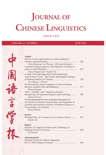
JOURNAL OF CHINESE LINGUISTICS
Exploring Linguistic Diversity Through a Chinese LensJOURNAL OF CHINESE LINGUISTICS, published by the JOURNAL CHINESE LINGUISTICS, is a prominent periodical that serves as a vital resource for researchers and scholars in the fields of linguistics and Chinese studies. With its ISSN 0091-3723, this journal has been contributing to the academic community since 1996 and continues to publish innovative research until 2024. Although it is classified in the third quartile (Q3) for both Arts and Humanities and Linguistics categories, its focus on Chinese linguistics positions it uniquely within this specialized domain. The journal is committed to advancing the understanding of Chinese language structures, usage, and context, encouraging interdisciplinary dialogue among linguists and language researchers. While currently not labeled as open access, the journal remains accessible to institutions and scholars worldwide, creating an invaluable platform for disseminating knowledge. As such, it plays a critical role in promoting linguistic diversity and cultural awareness within the academic landscape.
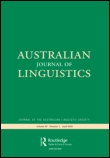
Australian Journal of Linguistics
Connecting Scholars to Language's Rich TapestryThe Australian Journal of Linguistics, published by Routledge Journals, Taylor & Francis Ltd, stands as a distinguished platform in the field of linguistics, fostering rigorous academic discourse since its inception in 1981. With an ISSN of 0726-8602 and an E-ISSN of 1469-2996, the journal has achieved a notable Q2 ranking in the linguistics and language category for 2023, indicating its quality and relevance within the academic community. With a Scopus ranking of #316 in Arts & Humanities and #373 in Social Sciences, it sits in the 71st and 68th percentiles respectively, underscoring its impact in the fields it encompasses. The journal aims to publish high-quality research articles that contribute to the understanding of linguistic theory, sociolinguistics, and applied linguistics, making it an essential resource for researchers, professionals, and students alike. The journal is based in the United Kingdom, at 2-4 Park Square, Milton Park, Abingdon OX14 4RN, Oxon, England, and actively encourages contributions that can expand the current linguistic discourse, reinforcing its commitment to highlighting diverse perspectives in language research.